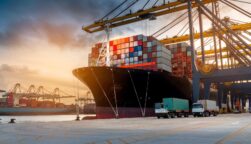Key takeaways
- An emergency rule has been passed that limits the issuance of non-domiciled commercial driver’s licenses, as a response to national security and public safety, according to the Federal Motor Carrier Safety Administration (FMCSA).
- The rule imposes strict requirements for noncitizens to obtain and renew a license.
- As our research shows, logistics businesses are struggling with a lack of drivers and as new procedures such as these come into place, the impact could be worsened.
An emergency rule announced last week that limits the issuance of non-domiciled commercial driver’s licenses has gone into effect, as of Monday. The rule has been justified as a response to both public safety and national security, and it aims to tackle compliance failures and fatal crashes.
The new rule places new restrictions on how commercial driver’s licenses are issued to noncitizens, and it introduces a new system for applying for and renewing these documents.
Our data shows that the driver shortage remains a prominent issue, and these new restrictions could result in a further drop of eligible workers. With the the new compliance issues coming in fast, logistics professionals might find the issue harder to ignore.
New Rule Restricting Non-Domiciled CDLs Goes Into Effect
An emergency rule restricting the issuance of non-domiciled commercial driver’s licenses (CDLs) went into effect on Monday. Originally announced last week by Transportation Secretary Sean Duffy, the rule is an interim final rule (IFR) backed by the Federal Motor Carrier Safety Association (FMSCA).
FMCSA said in a statement that it sees the issuing of the IFR as necessary because of a “two-front crisis” impacting both public safety and posing a threat to national security.
 This just in! View
This just in! View
the top business tech deals for 2026 👨💻
The rule has been implemented to tackle the number of fatal crashes and widespread state compliance failures. It aims to restore “the integrity of the CDL issuance processes” by limiting non-domiciled commercial learner’s permits (CLPs) and CDLs, including their renewals.
What New Requirements Must Operators Now Follow?
The rule puts in place strict requirements for noncitizens to obtain a CDL or CLP, and limits eligibility for those with unlawful status in the US for certain employment-based, non-immigrant categories. States now wanting to issue either a CDL or CPL are now required to:
- Verify applicant documents through the Department of Homeland Security’s Systematic Alien Verification for Entitlements System
- Keep non-domiciled applications for at least two years
- Match non-domiciled CLD/CLP expiration dates with US Immigration Form I-94/94A expiration dates or set licenses to expire in one year, depending on which is sooner
- Downgrade non-domiciled CDLs/CLPs if drivers become ineligible
Stricter restrictions have also been placed on California, as the state was found with 25% of its non-domiciled CDLs in violation of federal rules. Duffy has given the state 30 days to comply or face the loss of $160 million in federal highway funds, a penalty set to double if a second year of noncompliance is carried out.
“OOIDA and truckers across America applaud Secretary Duffy for responding to our concerns by taking substantial actions to crack down on the irresponsible issuance of non-domiciled CDLs, particularly in California. For too long, loopholes in this program have allowed unqualified drivers onto America’s highways, creating unnecessary safety risks for professional drivers and the motoring public alike. These enforcement actions will also remove bad actors from the road and restore accountability to the system. Today’s action is an important step toward safer highways and a stronger, more professional trucking industry.” – Owner-Operator Independent Drivers Association President, Todd Spencer
Another Barrier Amidst Workforce Shortages
According to FMCSA, the rule impacts around 200,000 current non-domiciled CDL holders, and 20,000 CPL holders. The agency estimates that only about 6,000 of these drivers annually will qualify for non-domiciled credentials under these new restrictions.
Overall, these rules could therefore see a dramatic reduction in CDL/CPL eligible applicants. As our latest logistics data shows, 63% of logistics professionals say their ability to recruit and retain drivers has either stagnated or worsened over the past year. A massive compliance shift such as these new CDL/CPL rules has the potential to deepen the issue.
Likewise, trucking companies are facing other compliance issues, such as a recent crackdown on English language proficiency requirements. As these challenges continue to rack up, logistics companies may find themselves struggling with finding suitable personnel.




